Monday, 27 December 2021
African Institute for Mathematical Sciences (AIMS) 2022 Master’s degree in mathematical sciences Scholarships (Fully Funded)
Covid-19 forces year-end race postponement to March or April
Covid in Wales: Limits on social gatherings come into force
Restrictions have been placed on social gatherings and two-metre social distancing has returned as part of Wales’ alert level two measures.
The Welsh government has brought in the rules as the number of Omicron variant cases continues to rise.
From 06:00 GMT on 26 December, groups of no more than six people can meet in pubs, cinemas and restaurants in Wales.
Outdoor events are limited to 50, with 30 people allowed indoors, which also applies to private homes.
‘Wave of infections’
Children are exempt from these limits on groups. Events such as weddings, civil partnerships, funerals and wakes will also be exempt from these same limits.
Speaking last Wednesday, First Minister Mark Drakeford said: “A wave of infections caused by the new, fast-moving and very-infectious Omicron variant is headed our way.”
On 26 December, Public Health Wales, reported 6,548 new cases, just short of Christmas Eve’s figure of 6,755, which was the highest since the start of the pandemic.
Within the latest figures, there have also been 304 new cases of the Omicron variant, bringing the total to 1,689.
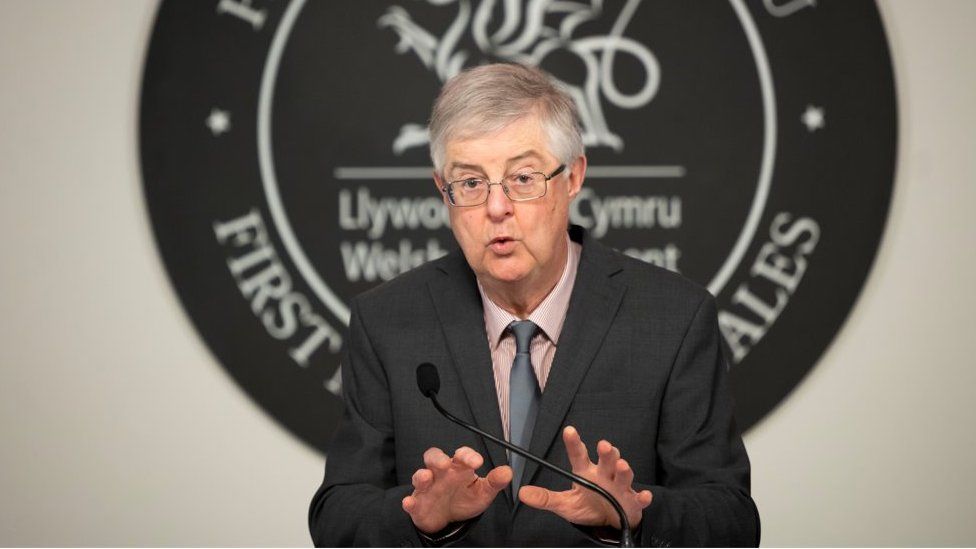 IMAGE SOURCE,GETTY IMAGES
IMAGE SOURCE,GETTY IMAGESThe first minister added that early action was needed to control the spread of Omicron, and it was a “misunderstanding” to think that if the variant was less severe, this “solves the problem”.
Mr Drakeford asked people to “flow before you go” and take lateral flow tests before socialising.
Licensed premises will have to offer table service only, face masks will have to be worn and contact tracing details collected.
Shaun Barnsley, who owns the Millers Arms in Chepstow, said it was another blow to the industry.
“Through the whole of December, we’re down about 65% on profit and on customers so it hasn’t been as jolly as what it could be,” he said.
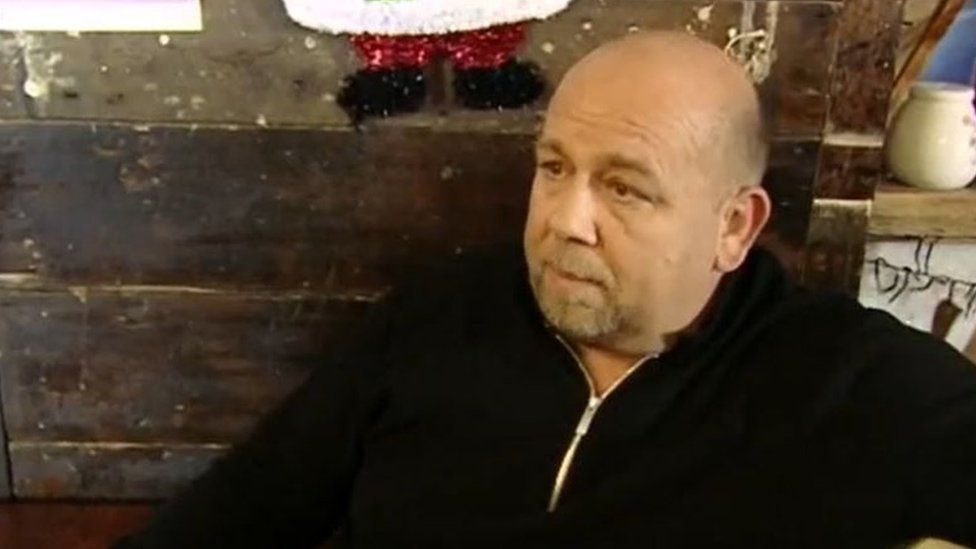
“We’ve lost six tables which is our covers inside the pub itself. Last year was a bit easier because we had the marquees outside with the heaters.
“Unfortunately now we’ve got to have planning permission which is extra cost and we just can’t afford that.”
He added: “It’s just been a struggle for the last 18 months. We were on the way up and then all of a sudden the new variant comes in and we’re back down to more closures of certain items we can and can’t do in a pub again.”
Nightclubs were due to close on 27 December but this has been brought forward by a day.
Wales’ rules for fully-vaccinated people who are a contact of someone with coronavirus have been changed – with a switch to daily testing instead of self-isolation, including for the Omicron variant.
As a result of the new restrictions, the Wales Millennium Centre has closed from 26 December until 15 January.
Cardiff and Swansea’s Winter Wonderland attractions closed at 20:00 GMT on Christmas Eve.
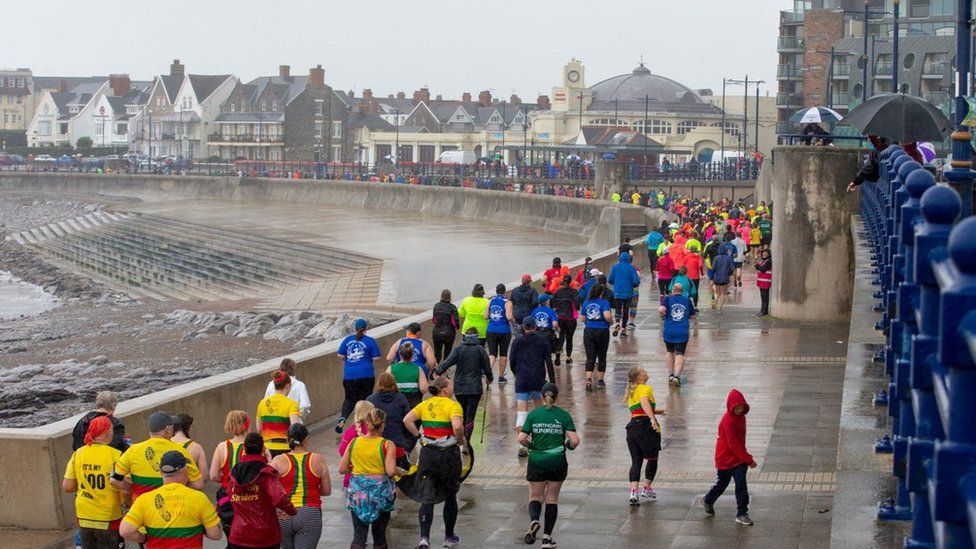 IMAGE SOURCE,GETTY IMAGES
IMAGE SOURCE,GETTY IMAGESParkrun, which organises 5km runs every Saturday morning throughout the UK, has cancelled all of its non-junior events in Wales from 1 January onwards.
Mr Drakeford said the numbers that could attend sporting events would be determined by the ability of the venue to manage social distancing and other reasonable measures.
The first minister set no end date for the new restrictions but said he wanted them in place for the shortest possible time.
Wales now has some of the most stringent Covid restrictions in the UK. Measures are also being imposed in Scotland and Northern Ireland.
Prime Minister Boris Johnson has said there will be no new rules in England before Christmas, but “can’t rule out” measures after then.
The Welsh government said a total of £120m will be made available for nightclubs, retail, hospitality, leisure and tourism businesses. That includes £60m announced last week.
……………………………………………………………
Janice Long: BBC DJ and broadcaster dies at 66
Janice Long, best known as a presenter on BBC Radio 1, Radio 2 and Top of the Pops, has died aged 66 after a short illness, her agent has confirmed.
Long, host of BBC Radio Wales‘ evening show since 2017, died at home with her family by her side on Christmas Day.
In a career that spanned five decades, she was the first woman to have her own daily show on Radio 1.
BBC director general Tim Davie described her as a “stellar presenter” who was loved across the industry.
Long presented Top of the Pops for five years – again, the first woman to do this – and had a late-night slot on Radio 2.
She was also one of the main presenters of the Live Aid charity concert in 1985.
Long was passionate about music and championed many artists long before they achieved chart success, including the band Primal Scream and singer Amy Winehouse, to whom she gave her first radio session.
Other artists to have been given early breaks by the broadcaster include Adele, The Smiths, The Coral and Frankie Goes to Hollywood.
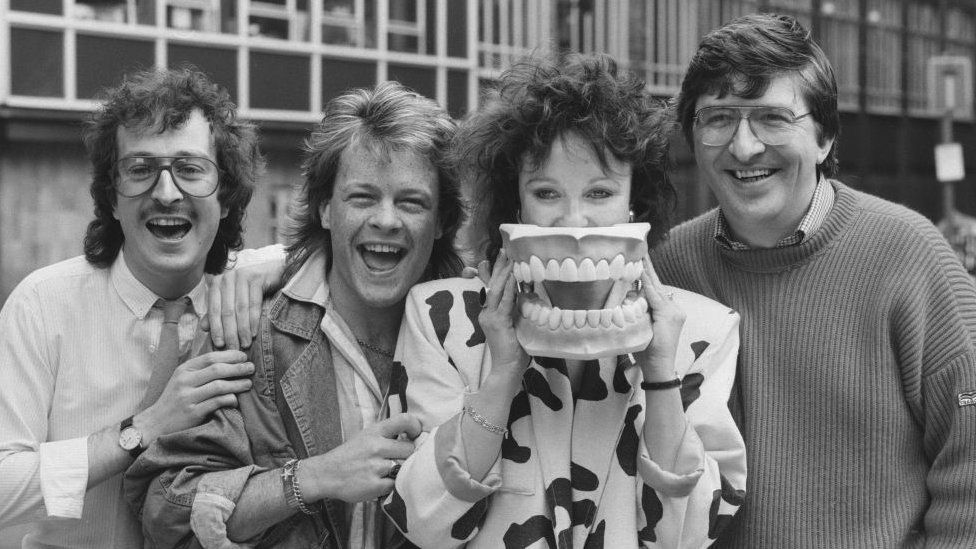 IMAGE SOURCE,GETTY IMAGES
IMAGE SOURCE,GETTY IMAGES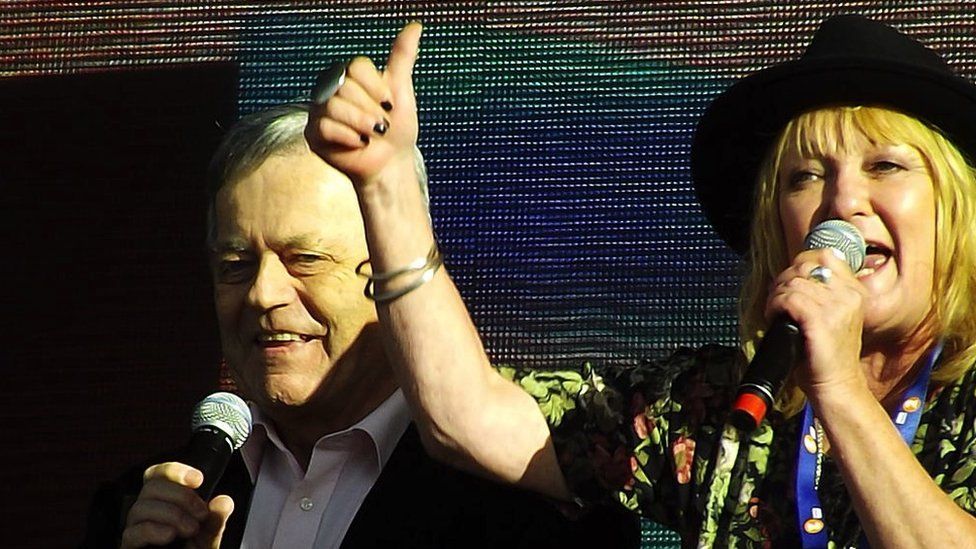 IMAGE SOURCE,GETTY IMAGES
IMAGE SOURCE,GETTY IMAGESBorn in Liverpool, her brother was fellow presenter Keith Chegwin, who died in 2017.
Long worked as cabin crew and in telesales before starting her broadcasting career as a station assistant at BBC Radio Merseyside in 1979. She joined Radio 1 as a presenter in 1983.
During her career she was a judge for the Mercury Music Awards and a patron of the Liverpool Institute for Performing Arts, founded by Sir Paul McCartney.
Long was also a DJ for BBC Radio 6 Music for two years, from its launch date in 2002.
Her agent, Nigel Forsyth, described Long as a “wonderful, warm human being and exceptional broadcaster”.
“She told a brilliant story and always made you roar with laughter with her sharp wit,” he said, adding that she leaves behind her husband Paul and two children who “she thought the world of”.
Midge Ure, singer and Live Aid organiser, said in a tweet Long was a “broadcast legend and absolute music lover” who had stood alongside him on the pitch at Wembley Stadium as Live Aid was announced.
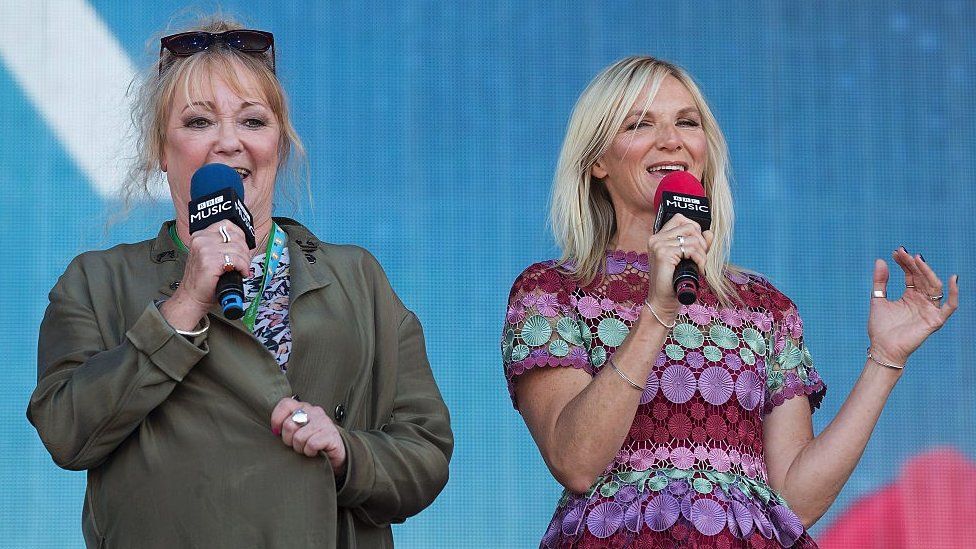 IMAGE SOURCE,GETTY IMAGES
IMAGE SOURCE,GETTY IMAGESOthers from the worlds of music and radio have also been paying tribute.
The Charlatans’ Tim Burgess said Long was one of a kind – a mentor for so many bands.
“To hear our records on her show was always the biggest thrill – her enthusiasm and love shone through,” he tweeted.
Peter Hook of New Order said she had been a great supporter of their music and a pleasure to be around.
Fellow Liverpudlian Ian Broudie, of The Lightning Seeds, said: “So very sad to hear of the passing of my friend Janice Long, who will be greatly missed by everyone who knew her.”
BBC Radio 2’s Ken Bruce said she was “a great broadcaster and always terrific company” and Steve Lamacq said Long’s Radio 1 show was “part of the blueprint” for the Evening Session he and Jo Whiley presented.
Long was “always warm, generous and a real fan”, he added.
BBC Radio 1 breakfast show host Greg James said Long was “so kind and sweet”, adding: “She picked the greats and got them in session before other DJs had even heard of them. She was such a laugh as well.”
Fellow Radio 1 DJ Adele Roberts tweeted to say: “Thank you for everything you did to inspire others and open doors for other women and radio presenters to prosper.”
Colin Paterson, head of BBC Radio Wales, said her radio programmes were never about herself but were seen as an opportunity to discover, share and champion music.
“There are few people who have done more to nurture new talent from music and the arts,” he said.
“She brought her passion for music to Radio Wales in 2017, supporting Welsh artists and Welsh language music ever since – we’ll miss her passion, her knowledge and her laugh.”
Long also presented a show on Greatest Hits Radio, which paid tribute to her “illustrious career” and “significant role and contribution to broadcasting”, adding she would be “greatly missed”.
……………………………………………………
Desmond Tutu: UK tributes paid to archbishop
Archbishop Desmond Tutu changed the world, the Archbishop of Canterbury has said following the death of the Nobel Peace prize laureate who helped end apartheid in South Africa.
The Most Rev Justin Welby was among a succession of UK figures paying tribute to Tutu, who died in Cape Town aged 90.
“The world is different because of this man,” he said.
Boris Johnson praised his leadership and humour. Archbishop Tutu studied and worked in the UK and often visited.
Archbishop Tutu was one of the driving forces behind the movement to end apartheid, the policy that saw racial segregation and discrimination against the black majority in South Africa by the white minority government.
He was credited with coming up with the term Rainbow Nation to describe the ethnic mix of post-apartheid South Africa, but in his latter years he expressed regret that the nation had not come together as he had hoped.
The prime minister added: “He was a critical figure in the fight against apartheid and in the struggle to create a new South Africa – and will be remembered for his spiritual leadership and irrepressible good humour.”
Labour Party leader Keir Starmer described Tutu as “a tower of a man and a leader of moral activism” who “dedicated his life to tackling injustice and standing up for the oppressed”.
He said: “His impact on the world crosses borders and echoes through generations.”
Scotland’s First Minister Nicola Sturgeon said: “His was a life that made the world a better place.”
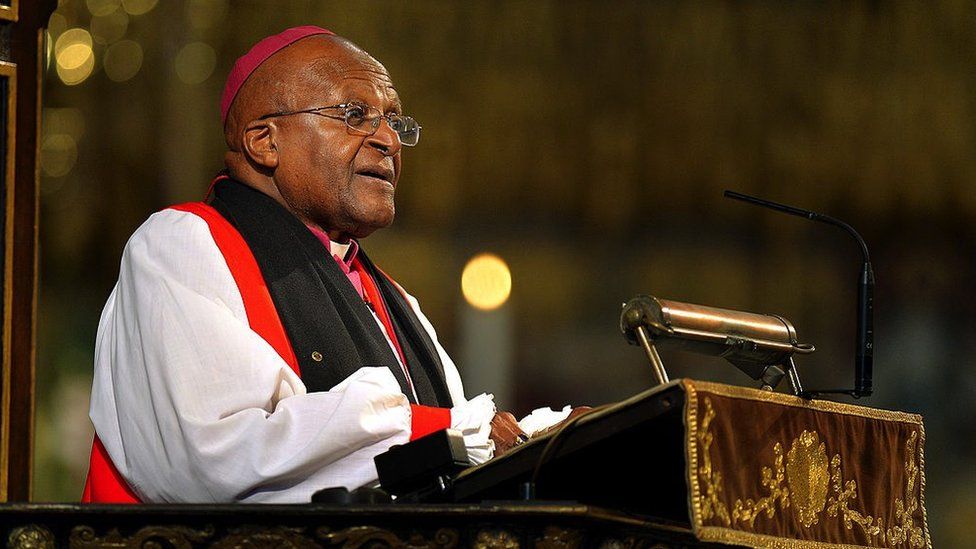 IMAGE SOURCE,GETTY IMAGES
IMAGE SOURCE,GETTY IMAGESDeputy Prime Minister Dominic Raab described Archbishop Tutu as a “truly great figure”.
He said he had met him in The Hague, when the archbishop was working for victims of war crimes, and added: “His adage, ‘don’t raise your voice, improve your argument’, has never felt more apt.”
Former cabinet minister Lord Hain, who grew up in South Africa and was a leading anti-apartheid campaigner, said Tutu was “somebody on Nelson Mandela’s level who inspired millions with his honesty, his vision, his courage and his sincerity”.
At the height of the anti-apartheid struggle, Tutu “roused the faithful, inspired people and also had a way of engaging that was soft and yet hard”, Lord Hain said, adding that he “spoke truth to power”.
Ex-president of the British Anti-Apartheid Movement and former Liberal Party leader, Lord David Steel, said: “Desmond Tutu was a gigantic and effective opponent of apartheid”. He said Tutu’s “vital role can never be underestimated”.
Former prime minister Tony Blair was “saddened” to hear of Tutu’s death. He said the archbishop’s “spiritual leadership and willingness to take action in pursuit of peaceful change earned him the respect of millions in South Africa and the rest of the world”.
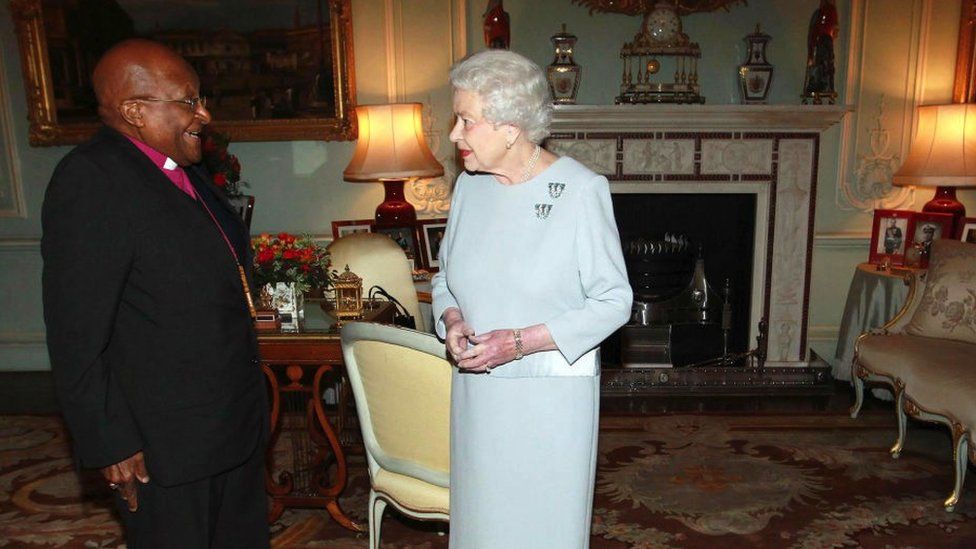 IMAGE SOURCE,GETTY IMAGES
IMAGE SOURCE,GETTY IMAGESTutu first lived in the UK in the 1960s, where he studied King’s College London and received degrees in theology.
He was in the country for five years and then returned in 1972, as vice-director of the Theological Education Fund of the World Council of Churches. Tutu eventually went back to South Africa to become the first African to be appointed Anglican Dean of Johannesburg.
Tutu visited Birmingham in 1989 as part of the city-wide Christian Celebrations and he and his wife saw a number of establishments, including the Nelson Mandela School in Sparkbrook.
When he was there, he criticised what he termed “two-nation” Britain, and said there were too many black people in the country’s prisons.
Tutu was given the freedom of Hull in 1999 after giving the annual Wilberforce lecture there, commemorating the life and achievements of anti-slavery campaigner William Wilberforce. And he returned to the UK yet again in 2004 as visiting professor in Post-Conflict Societies at King’s College London.
‘World feels smaller’
Archbishop Welby said Tutu – “always known as Arch” – was “a prophet and priest, a man of words and action, one who embodied the hope and joy that were the foundations of his life”.
He added: “He was a man of extraordinary personal courage and bravery: when the police burst into Capetown Cathedral, he defied them by dancing down the aisle.”
Tutu’s love “transformed the lives of politicians and priests, township dwellers and world leaders”, he added, saying he was a pioneer and “a man of enormous vision”.
He also spoke of his “extraordinary, bubbly, overwhelming sense of humour”, adding “you laughed the whole time when you met him”.
Archbishop of York Stephen Cottrell said “the world itself feels a little smaller without him”.
He said Tutu had been asked to chair the Truth and Reconciliation Commission in Cape Town as “one of the few people in South Africa other than Nelson Mandela himself, who could unite the nation and carry the trust of everyone.
“In this respect, he was a giant,” he added.
The archbishop added that when he got to chapel this morning to celebrate Eucharist, he might “dance a little jig in thankful memory of this wonderful human being”.
Former Archbishop of York Dr John Sentamu said Tutu was a man of “amazing faith” who was “so rooted in Christ he feared nothing”.
He added: “His feet were firmly on the ground but always looking to the horizon of hope.”
…………………………………………………………
A Royal Encounter at Madame Tussauds London - Part 7
Exploring the Majesty of the Palace and Its Distinguished Guests Greetings, ladies and gentlemen! My name is Sofonie Dala, and I am deligh...

-
Since the July 26 coup, Niger has become the latest hotbed of disinformation in the troubled Sahel region as West African powers grapple wit...
-
Angolan President of Republic João Lourenço marked Saturday (26) the third year of his five-year in office, marked by the strong negative ...
-
Celebrating Purpose, Passion & Powerful Public Engagements! Dear Changemakers, As we reach the midpoint of 2025, we’re thrilled to sha...





